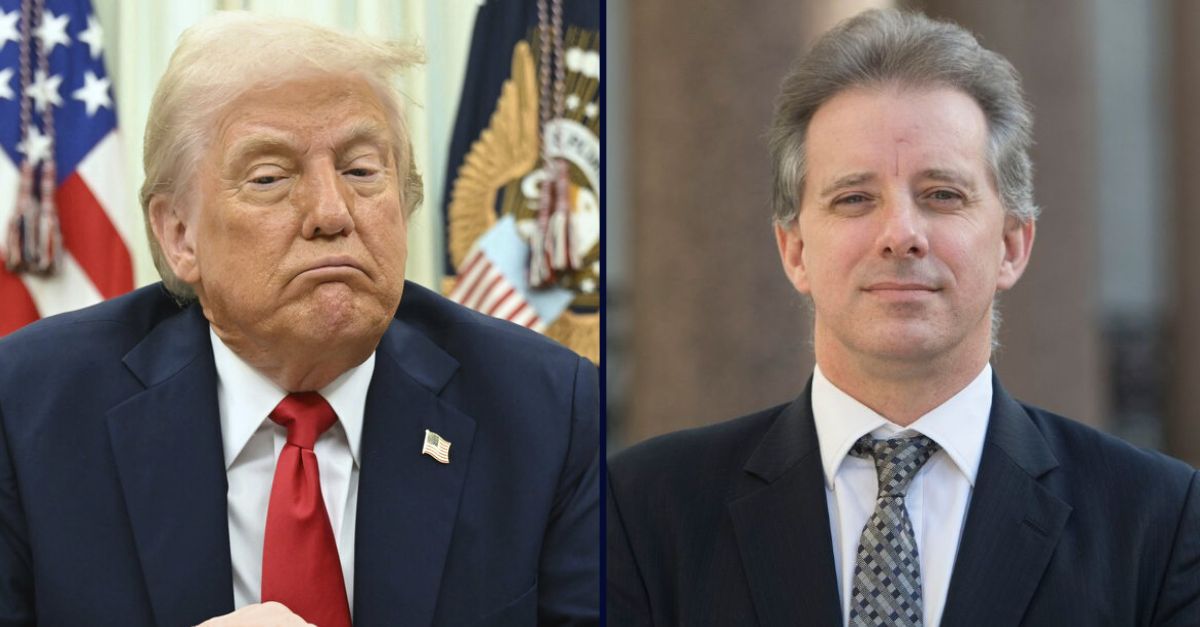Share this @internewscast.com

Left: President Donald Trump answers questions from reporters before signing an executive order in the Oval Office of the White House in Washington, Monday, March 31, 2025 (Pool via AP). Right: File photo dated 7/3/2017 of Christopher Steele, the former MI6 officer known for compiling a dossier on Trump’s alleged ties to Russia (Press Association via AP Images).
A London-based British judge on Thursday ordered President Donald Trump to pay approximately $800,000 to a private intelligence firm managed by former MI6 agent Christopher Steele, following a data protection lawsuit that had been dismissed by a different judge the previous year.
On February 1, 2024, High Court of Justice King’s Bench Judge Karen Steyn determined that the 45th and 47th president “lacks reasonable grounds to pursue a claim for compensation or damages.” Consequently, a judgment was entered in favor of the intelligence company, primarily on procedural bases.
Two separate accountings followed.
On March 7, 2024, Steyn ordered Trump to pay initial legal fees of 290,000 pounds sterling — roughly equivalent to just north of $384,000, according to the exchange rates at the time. But, the judge warned, Trump would be responsible for the cost “of the entire claim.”
Now, the final numbers are in.
Senior Courts Costs Office Judge Jason Rowley ultimately doubled Trump’s costs, tacking on an additional 330,000 pounds.
In January, attorneys for Orbis complained that Trump had not yet paid the initial, court-ordered amount, according to The Guardian.
“No real reason has been given for the nonpayment,” lawyer Mark Friston said.
Rather, the intelligence company’s lawyer said, Trump was claiming “sovereign immunity” since he had recently become U.S. president again. That lawyer characterized that argument as “completely hopeless” because the lawsuit initiated by Trump was private.
“It’s difficult to get instructions when your client is president of the free world and trying to turn everything upside down,” Trump’s lawyer, Jacqueline Perry, protested. “This isn’t high in his area of importance.”
But the court was not having it.
During that late January hearing, Rowley gave Trump 28 days to pay the outstanding amount due or be cut out of the final negotiations.
That deadline, in turn, whooshed by.
Rowley then held a three-day hearing to determine the final amount, where Trump was unable to be represented by counsel.
Rowley termed the final sum “both reasonable and proportionate” and tacked on some hefty interest with a daily 12% accrual rate.
Trump’s latest lawyer in the case had previously tried to paint her client as a victim, noting that an earlier barrister improperly filed the lawsuit over the lurid Steele dossier using the wrong statute.
The underlying lawsuit was filed in October 2022 against Steele and his co-owned company, which compiled the controversial dossier throughout 2016. The initial claims were based on two U.K. data protection laws passed in 2018. Trump’s legal team essentially moved to amend the lawsuit and only sue Orbis in February 2023, with a claim based on a 1998 data protection law.
In the end, Steyn determined Trump’s lawsuit contained no valid claims under the 2018 laws, because those two laws “came into force” well after the completion of the complained-of memos in the 2016 dossier. Steyn also found the six-year statute of limitations for the claim based on the 1998 law had passed by the time Trump’s first lawyer, Hugh Tomlinson, included that later claim.
Trump’s amended lawsuit was based on two separate and sexually charged memos in the dossier, which contained 17 memos in total.
Memo 80 referred to the infamous “pee tape” in which Steele alleged Russian intelligence had video of Trump engaging in “perverted sexual behavior” — namely “golden showers” with sex workers in Moscow. The memo also claims Trump requested and watched the women urinate on a bed once slept on by Barack and Michelle Obama in order to somehow spite the couple. All this, the dossier claimed, provided the Russian Federation with considerable blackmail material.
Memo 113 contains claims that Trump paid bribes to Russian officials in the course of furthering his business empire. Additionally, the memo claims Trump took part in “sex parties” in St. Petersburg and then tried to coerce or bribe all the witnesses into silence.
None of those claims has ever been substantiated.
In her dismissal, Steyn noted that her judgment did not address the alleged “personal and reputational damage and distress” cited by Trump in his original complaint.

















